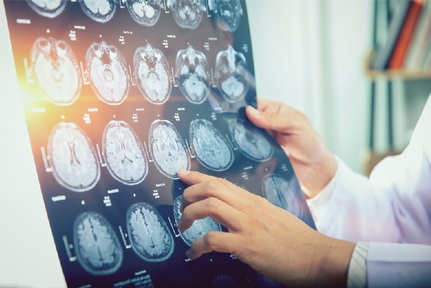Volunteers from 'all walks of life' encouraged to take part in new Parkinson's trial
With 10 million people worldwide diagnosed with Parkinson’s disease, a research team from Exeter University is inviting people from "all walks of life" to take part in a series of trials to find new ways of understanding what happens in Parkinson’s before and after it is diagnosed and explore the role sleep plays in the development of the disease.

Funding of a £2.6m grant from the Michael J Fox Foundation and a donation of £3 million from electrical wholesalers City Electrical Factors Limited will fund a research team led by the University of Exeter.
Both studies are led by the University of Exeter’s Neurodegeneration Imaging Group, headed up by director, Professor Marios Politis.
Professor Politis said: “Around 10 million people worldwide have Parkinson’s disease, yet we still know relatively little about this devastating condition. This funding from The Michael J Fox Foundation and additional donors will enable us to conduct an in-depth study to investigate the interplay between cells, neurotransmitters and genetics, and how they impact on the development of the condition.”
’If you have Parkinson's or even if you don't, we need you!’
According to Parkinson’s UK, one in 37 people alive today in the UK will be diagnosed with disease. The 3 main symptoms of Parkinson's disease are involuntary shaking of particular parts of the body (tremor), slow movement and stiff and inflexible muscles.
Parkinson's disease is caused by a loss of nerve cells in part of the brain called the substantia nigra. This leads to a reduction in a chemical called dopamine in the brain. Dopamine plays a vital role in regulating the movement of the body. A reduction in dopamine is responsible for many of the symptoms of Parkinson's disease.
The team will use state-of-the-art imaging facilities in London to understand how four genes already known to be implicated in Parkinson’s act differently, and how that influences the molecular activity in the brain. This could shed light on the processes involved in the early stages of Parkinson’s in other groups.
Dr Beckie Port, research communications manager at Parkinson's UK, said: “We welcome this new injection of funding for vital research. Parkinson's is the world’s fastest growing neurological condition, and currently there is no cure.
"As researchers race to find a cure, one vital ingredient is missing: people who can take part in research. We urgently need people from all walks of life. If you have Parkinson's or even if you don't, we need you!
“Here we have a unique opportunity for people to step up and take part in, potentially, ground-breaking research. It is simple to help and participate.
Everyone can play a part in the search for a cure for Parkinson's. The more people who get involved, the faster we'll get there. I urge members of the public to join Parkinson’s UK’s research support network and join studies like Exeter’s because together we can end Parkinson's.”
’This could represent a major step forward in understanding' Parkinson's Disease and Alzheimer's
In a separate study, the team will investigate the role sleep plays in the development of Parkinson’s. In previous research, the team found that the build-up of proteins in the brain are linked to both Parkinson’s and Alzheimer’s disease.
Alzheimer’s disease is the most common cause of dementia and according to the Alzheimer's Society, there are more than 520,000 people in the UK who have dementia caused by Alzheimer’s disease and this figure is set to rise.
Professor Politis said: “We’re also investigating the process of how the brain clears out waste during sleep, and how that may impact on Parkinson’s disease developing. These innovative studies are designed to provide urgently needed answers and hopefully new ways to intervene early to improve lives.”
The study will take place in London and Exeter with participants wearing wrist monitors, completing sleep diaries, and providing blood samples to enable the team to analyse blood markers and genes.
'I’d urge anyone affected by Parkinson’s disease to join us in our quest'
Dr Edoardo De Natale, one of the study leads at the University of Exeter, said: “This cluster of studies represents the most robust research to date to examine the role of the brain’s waste-clearing glymphatic system on the development of Alzheimer’s and Parkinson’s disease.
"As the system was only discovered quite recently, this could represent a major step forward in our understanding of these conditions that impact millions of people worldwide.”
Dr Heather Wilson, methodology lead at the University of Exeter, said: "A lot of questions remain unanswered for patients with Parkinson’s and Alzheimer’s disease.
"We hope this research can help to provide some better understanding of the disease onset and progression and ultimately help to find much needed disease modifying treatments.
“These research studies would not be possible without the willingness of the patients and their families to participate.
“I’d urge anyone affected by Parkinson’s disease to join us in our quest for answers.”
Anyone wishing to take part in the study will need to be able to access the imaging facilities in London or attend clinics in Exeter. To find out more, email neuro@exeter.ac.uk.
Latest News
 29-Jul-24
Dementia Bus gives carehome.co.uk staff insight into life with dementia
29-Jul-24
Dementia Bus gives carehome.co.uk staff insight into life with dementia
 27-Jul-23
UK's top home care agencies in 2023 revealed
27-Jul-23
UK's top home care agencies in 2023 revealed
 30-Nov-22
A quarter of older people keep their falls secret from family
30-Nov-22
A quarter of older people keep their falls secret from family
 29-Nov-22
'Covid-19 has not gone away' say terminally ill
29-Nov-22
'Covid-19 has not gone away' say terminally ill
 28-Nov-22
IT consultant who received poor care opens 'compassionate' home care business
28-Nov-22
IT consultant who received poor care opens 'compassionate' home care business